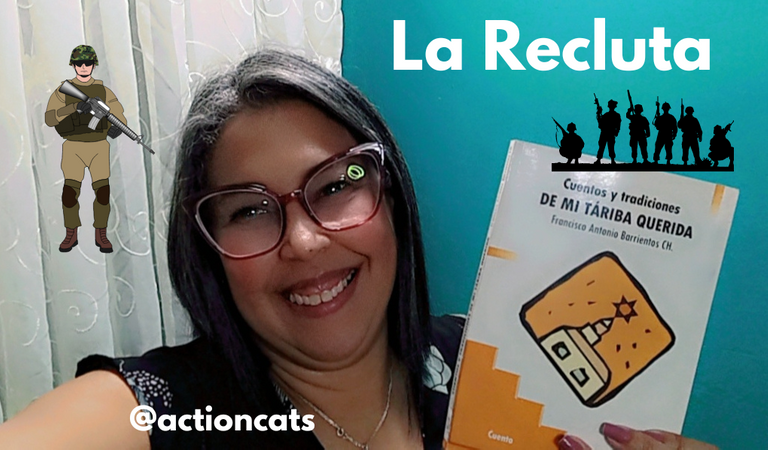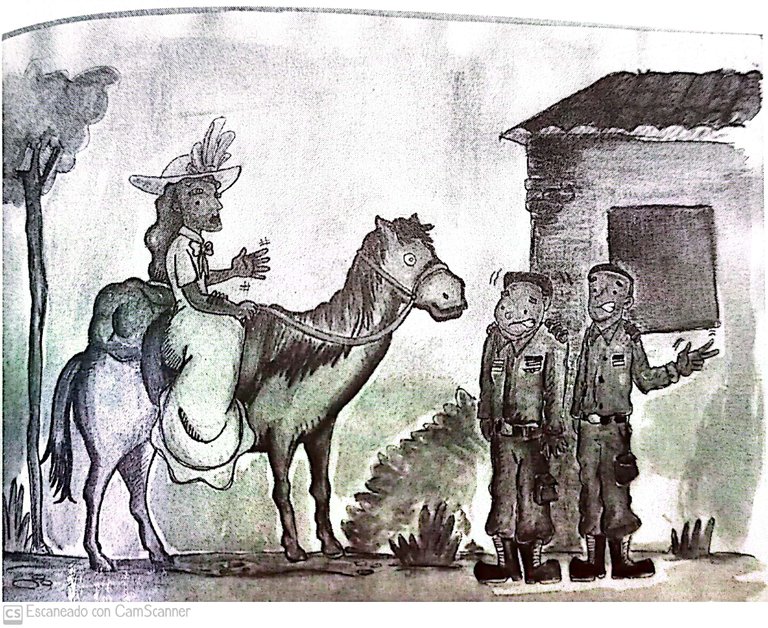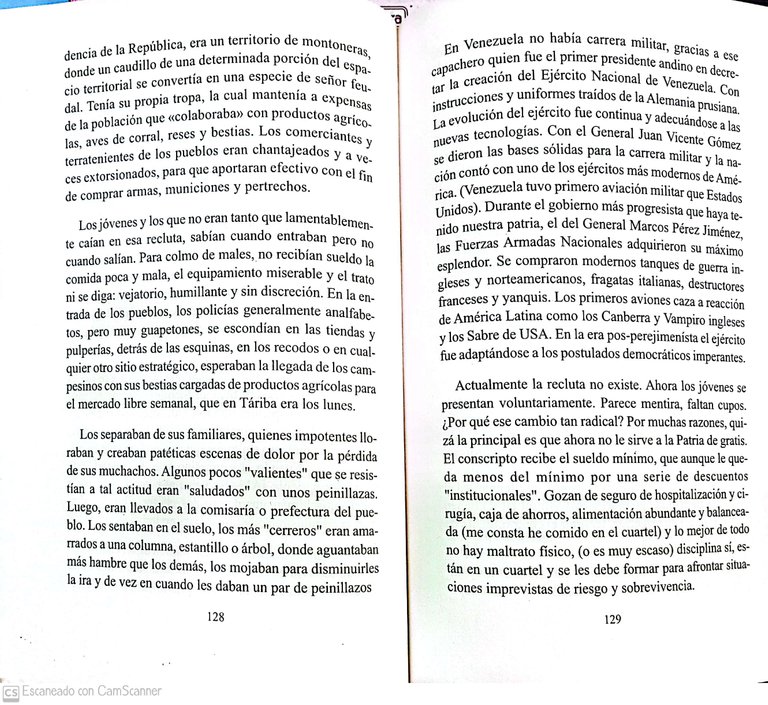The Recruit// La Recluta


Feliz lunes amigos de la lectura una nueva semana comienza, estoy feliz de estar nuevamente por acá con ustedes para compartir otro capítulo del libro “Cuentos y tradiciones de mi Táriba Querida”, que curiosamente toca un tema que viví en sus dos etapas de mi vida, que ha cambiado sí, pero en algunos aspectos todavía requiere una mejora o mejor dicho ajustes, así que además de compartir con ustedes lo que el autor nos comparte en este capítulo también les compartiré mi experiencia en este tema. El título de este capitulo es:

The Recruit/ La Recluta

This is the subject that the author touches on in this chapter and it is totally true that this happened, and that young men and boys were held against their will in police stations or other places, and then taken to different places to do their military service, which in theory is for two years.
Cuando era una joven en ciertas temporadas del año los jóvenes y hombres hasta de hasta cierta edad procuraban evitar las calles, era la temporada de recluta, ahora ¿Qué era la recluta? era la época del año en la que se llevaban a cumplir servicio militar a todos aquellos que tuvieran la edad y no pudieran justificar su exclusión de este servicio por estudios o trabajo.
Este es el tema que toca el autor en este capítulo y es totalmente cierto que esto ocurría, y que se veían jóvenes y hombres retenidos en contra de su voluntad en estaciones de policía u otros lugares, para luego ser llevados a distintos lugares a prestar su servicio militar que en teoría es de dos años.

The young men and boys refused to go to the military service for various reasons such as the poor conditions in which they were treated, mistreatment, not only verbal, but also physical, besides the fact that they were not paid any salary, and the food was not the best, besides the fact that it would not be pleasant to be sent to the border to face the guerrillas.
Leer este capitulo me hizo recordar que realmente como lo señala el autor el escuchar la palabra recluta era algo aterrador para los jóvenes durante los siglos XIX y principios de los XX y como suele ocurrir los que prestaban servicio militar y todavía lo hacen son los hijos de los pobres, no se ven hijos de personas adineradas o de personas en puestos importantes del gobierno, así que eran en aquel momento vulgarmente hablando cazados, para que cumplir la cuota de hombres necesarios.
Los jóvenes y hombres se negaban ir a prestar servicio militar por diversas razones como las condiciones paupérrimas en las que se les trataba, maltrato, no solo verbal, también físico, además de que no se les devengaba sueldo alguno, y la comida no era la mejor, además de que no sería nada grato ser enviado a la frontera a enfrentar a la guerrilla.

Pero eso a mejorado desde hace unos 20 años no se recluta a los jóvenes la inscripción es voluntaria y muchos se acercan y se inscriben ya que ahora gozan de un salario, servicio médico, pueden optar por culminar sus estudios de secundaria si no lo han hecho y con continuar una carrera militar si así lo desean. El autor hace también referencia a que actualmente los alimentan de mejor manera y aquí es donde entra parte de mi experiencia, tal vez en algún momento fue así, pero hace un año mi hijo se enlisto de manera voluntaria para prestar servicio militar y una de las cosas de las que mas se quejaba era el alimento, era poco y malo, quiero pensar que esto se debe a la situación país, pero es triste cuando tu hijo te dice que hacen distinción entre lo que comen los oficiales y lo que le dan a los soldados o tropa, esto es un motivo para desmotivar a muchos de los que se acercan de manera voluntaria a cumplir este servicio. Es cierto que hay disciplina y es necesario, pero también hay oficiales que la toma de manera arbitraria contra los jóvenes solo por maldad o por desquitarse de como los trataron a ellos en su respectivo momento.

Now, returning to what the author shares in this chapter it is interesting to know that until in Venezuela there were no military careers or army until one of the presidents Cipriano Castro decreed the creation of the National Army of Venezuela that was the first step and then General Juan Vicente Gomez took steps to create military careers and was concerned and occupied for Venezuela to have what was at the time one of the most modern armies of America.
Ahora bien, volviendo a lo que el autor nos comparte en este capítulo es interesante saber que hasta que en Venezuela no existían carreras militares o ejercito hasta que uno de los presidentes Cipriano Castro decreto la creación del Ejercito Nacional de Venezuela ese fue el primer paso y luego el General Juan Vicente Gómez dio los pasos para creación de carreras militares y se preocupó y ocupo para que Venezuela tuviera lo que fue en su momento uno de los ejércitos más modernos de América.

En resumen, leer esta capitulo me hizo recordar como eran el tiempo de la recluta, durante mi juventud, en la que vi a muchos de mis amigos y compañeros de clase correr para eludirla y como lo es ahora y además conocer algunos aspectos históricos de la creación de las diferentes carreras militares en mi país.



https://twitter.com/Cristinanuitter/status/1551745946517733376
The rewards earned on this comment will go directly to the people( @actioncats ) sharing the post on Twitter as long as they are registered with @poshtoken. Sign up at https://hiveposh.com.
Conscription sure is a fearful kind of word; I guess in different parts of the world it carries lots of different connotations. And unfortunately, I wouldn't be suprised if it is an idea we don't hear a lot more into the future.
I don't see this as a reason for countries to have their armies, but I think they should give their soldiers everything they need because they are risking their lives and if they die their families may be left homeless. thanks for reading and commenting.
Mientras leía tu publicación pasaron por mi mente tantos recuerdos de esa época en relación al tema de la recluta, mas de un amigo, familiar y conocido vivió esto que nos relatas, una realidad que vivimos los venezolanos.
Me gusta este tipo de lectura voy a buscar este libro amiga 🤗
Hola bella, leer este capitulo me hizo recordar a mi también , vi como señale a mas de una migo y compañero correr y evitar salir de casa para no ser atrapado, este libro es genial cada capitulo narra algo diferente y en la mayoría el autor pone un poco de humor es muy bueno